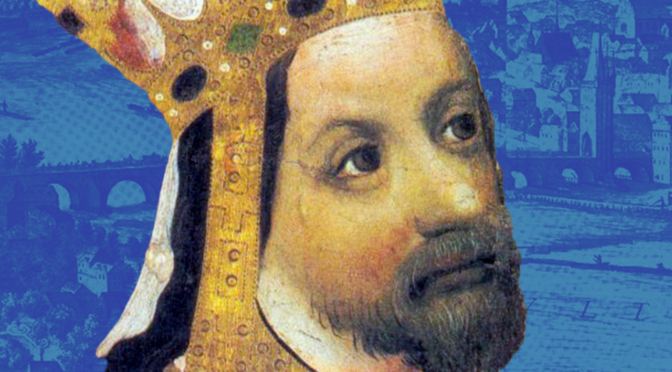“Grand entretien” with Pierre Monnet.
Charles IV, King and Emperor in Europe (1316–1378)
This “grand entretien” is organized in partnership with the French Institute in Prague, Karolinum Publishing and the Institute of Philosophy of the Czech Academy of Sciences.
Date: Wednesday, November 20, 2024, at 6:00 PM
Location: French Institute in Prague, Štěpánská 35, Prague 1
Langue: French with simultaneous translation into Czech
Moderation: Václav Žůrek, Center for medieval studies, Institute of Philosophy of the Czech Academy of sciences
Pierre Monnet will present his book: Charles IV, un empereur en Europe, published in Czech in 2023 at Karolinum Publishing in the translation by Jana Žůrková, and funded by « Fonds Šalda ».
Abstract
Charles IV, of the House of Luxembourg, was born and died in Prague. Partly raised at the French court, he was King of Bohemia in 1347, King of the Romans (i.e. the three kingdoms of Germania, Italy and Arles) in 1346/1349 and Emperor of the Holy Roman Empire, crowned in Rome in 1355. Under his reign, he assembled a vast continental empire, but he was also a king and emperor in times of crisis: the Hundred Years’ War, the Great Plague pandemic, the beginnings of the papal schism at his death, the Ottoman thrust at the eastern gates of Christendom. He introduced new ways of governing: the written word, both political and memorial and sacred; architecture, with the sovereign power to build a capital and erect a castle bearing his name; the collection of relics; the promotion of new ‘national’ saints; the commissioning of manuscripts, portraits, illuminations, luxury and court objects ; incessant itinerancy in order to get to know and govern his states as closely as possible; institutional reform; the government of plurality through the diversity of languages, customs and cities of residence; the promotion of a literate and academic environment around the University of Prague.
In the end, the presentation will emphasise the great shift of the Empire from the west to the east of Europe, bringing these two sides of the continent closer together, which could then begin to see itself as a more compact Europe, detached from its eastern and Byzantine counterpart. The presentation will also examine another great ambition of the reign and of the king, which ultimately failed to materialise: that of building perhaps, as Saint Louis did in the thirteenth century for the monarchy of France, a holy king. The discussion will also highlight two historiographical questions suggested by the writing of the book: what it means to write a royal biography today, and how to pose the problem of the birth of the person, the individual, the subject at the end of the Middle Ages.
Pierre Monnet, born in 1963, is an Ecole Normale Supérieure Alumni (Ulm, 1984-1988) and agrégé in history (1987). After completing his thesis at the EHESS in 1994 entitled Pouvoirs, affaires et parenté à Francfort-sur-le-Main aux XIVe et XVe siècles [Power, business and kinship in Frankfurt am Main in the 14th and 15th centuries], he was appointed lecturer at the University of Burgundy (1994-1996) before joining the Mission Historique Française en Allemagne de Göttingen in 1996, where he was director from 1999 to 2003. After obtaining a Habilitation à Diriger les Recherches (2003) on the information and communication policies of German cities at the end of the Middle Ages, he was appointed Professor of Medieval History at the University of Versailles/Saint-Quentin-en-Yvelines, then Director of Studies at the Ecole des Hautes Etudes en Sciences Sociales in 2005. From 2007 to 2011 he was Vice-President and then President of the Franco-German University (Saarbrücken) and from 2011 to 2022 he directed the Franco-German Institute for Historical and Social Sciences at the University of Frankfurt. He has since returned fully to EHESS, where he heads the Doctoral School.
His research interests include the history of towns and urban societies in the Middle Ages, particularly in the Holy Roman Empire; processes of memory and social distinction in the Middle Ages; global history in the late Middle Ages; comparative political structures between France, the Empire and Bohemia in the late Middle Ages; and historiographical transfers between France and Germany.
Among his main publications:
- Les Rohrbach de Francfort. Pouvoirs, affaires et parenté à l’aube de la Renaissance, Genève, Droz, 1997 (Travaux d’Humanisme et de Renaissance, 317).
- Villes d’Allemagne au Moyen Age, Paris, Picard, 2004. Bouvines 1214-2014 : Histoire et mémoire d’une bataille/Eine Schlacht zwischen Geschichte und Erinnerung. Approches et comparaisons franco-allemandes/Deutsch-französische Ansätze und Vergleiche, Bochum, Winkler Verlag, 2016.
- Charles IV. Un empereur en Europe, Paris, Fayard, 2020 (Prix du Livre d’histoire de l’Europe 2021 et Prix Gobert de l’Académie des Inscriptions et Belles Lettres 2021) et traduction allemande : Karl IV ; Der europäische Kaiser, Darmstadt, WBG, 2021.
- Coordination avec Yann Potin et Julien Loiseau de l’ouvrage Histoire du monde au XVe siècle, sous la direction de Patrick Boucheron, Paris, Fayard, 2009.
- Avec Jean-Claude Schmitt (trad., éd., prés.), La Vita de Charles IV de Bohême (1316-1378), Paris, Belles Lettres, 2010 et Les autobiographies souveraines de l’Antiquité aux Temps Modernes. Orient et Occident, Paris, Publications de la Sorbonne, 2012.
- Avec Heribert Müller (dir.), 1414-2014 : le Concile de Constance, un regard franco-allemand, Rome, AHC, 2016. Avec Etienne François et Thomas Serrier, Europa, notre histoire, Paris, les Arènes, 2017.

